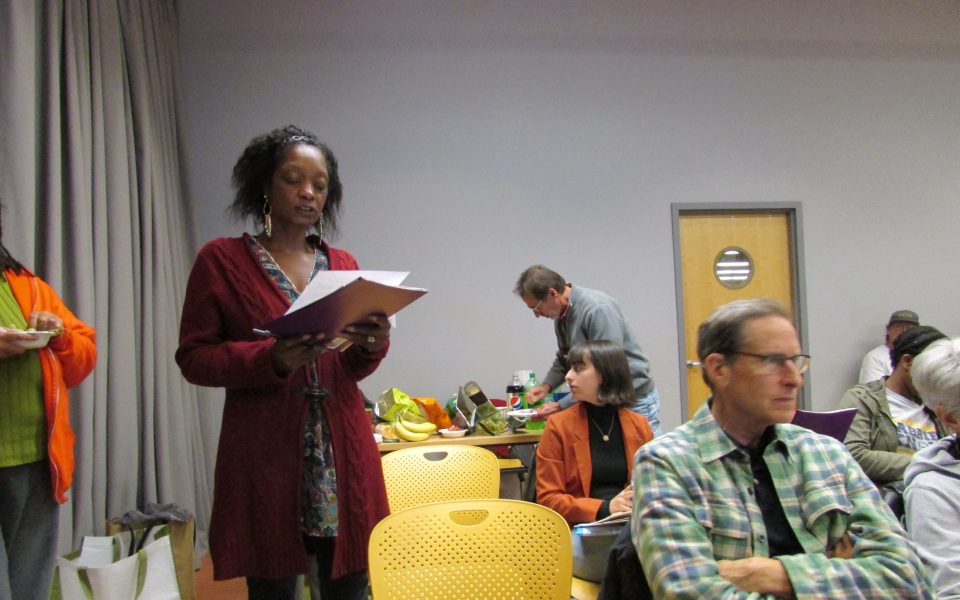The numbers are not surprising, but
it’s striking to see them nailed down: In a survey of more than 200 people
experiencing homelessness in Greensboro, 51.5 percent reported being cited,
harassed or arrested by police for hanging out — or loitering, as it’s known in
the general statutes.
Exactly half said they’d been
harassed for sleeping.
Almost half for sitting or lying
down.
More than a third for asking for
money, also known as panhandling.
The share of survey participants who
were black was 68.5 percent, compared to 41.8 percent of the city’s population.
Forty-two percent of the survey
participants told the researchers from Guilford College and UNCG that they
believed they had been targeted by police for appearing to be homeless. And
43.6 percent said they believed they had been targeted for race, manifesting a
double burden. Economic status, gender, disability and sexuality also factored
into survey participants’ perceptions that they were targeted by the police.
The Greensboro Police Department routinely denies that its officers show bias. When I interviewed two men experiencing homelessness in the summer of 2018, they complained about two police officers in particular whom they said were notorious for harassment. Capt. John Thompson, who oversees the Center City Division, told me at the time: “There’s nothing in my experience to say they’re overly aggressive.”
To date, no court that I’m aware of has
found the city of Greensboro and its police force liable for violating the
civil rights of people experiencing homelessness, but it’s hard to not see a
pattern.
The report, which is entitled A Safe Place to Stay: Combating Homelessness, Police Violence and Jim Crow in Greensboro, draws a through-line from black codes that enforced exclusion and Jim Crow through “broken windows” policing and the criminalization of homelessness beginning in the 1990s. It’s a tragic mark of failure that these laws and customs have all flourished since the 1868 ratification of the Fourteenth Amendment, whose guarantee of equal protection under the law has been plagued by spotty enforcement.
“There’s legal mechanisms — specific
laws that are used to reinforce inequality, criminalizing mundane and basic
life-sustaining activities,” said Marcus Hyde, an organizer with the Homeless
Union of Greensboro, during a presentation of the report at McGirt-Horton
Library on Tuesday evening. “When it was asked what do you get messed with for?
What do you get harassed, cited and arrested for? Those were basic things —
sitting on the sidewalk, lying down. Those were things people necessarily have
to do if they lack housing, if they lack the means to afford housing on their
own.”
And then there’s custom.
“The other part of Jim Crow’s very
much real, especially in this town,” Hyde said. “We have a history knowing that
it goes beyond the law, right? There doesn’t need to be a specific statute that
people treat certain minority populations different, right? And people have had
to fight that, too.”
The report examines not only
policing, but also housing. It limns a history of drastic divestment by the
federal government from low-income housing from 1978 to 1983, and various
programs to jettison public housing units going by names like HOPE VI,
Transforming Rental Assistance and Rental Assistance Demonstration.
In 2016, Greensboro voters approved
a $25 million housing bond. Beth McKee-Huger, the retired executive director of
the Greensboro Housing Coalition, said that despite being billed as
“affordable,” the housing units produced through the investment of bond funds
are typically out of reach for the poor people who are in most dire need of
housing.
“The city wanted to leverage that
$25 million by having the city put some money in that private developers will
put money in,” she said. “And by putting money into huge projects, where they
come up with $800-$900 a month rents and leverage millions and millions of
dollars, and they say, ‘See, doesn’t this look good? We’ve leveraged all this
money.’ So they’ve leveraged all the money, but they haven’t come up with
housing that’s affordable to the lowest income people. You don’t get much
leverage when you’re building housing that’s $300 a month. But it’s what’s
needed most.”
The report includes a 10 Point
Platform summed up as “Homes, Jobs & Justice Now — Not Death in the
Streets.” The “toolkit” handed out to the roughly 40 people who attended the
presentation includes model policies on eviction diversion, written consent for
police searches, guidelines for police interactions with people experiencing
homelessness and non-police mobile crisis services, which the group wants to
see adopted by Greensboro City Council.
They’re armed with data, they’re
building coalitions, and they’re coming to a city council meeting in the near
future.
“They have violated all of my rights
when I experienced homelessness, and they still continue to violate peoples’
rights in this report,” said LaTonya Stimpson, a member of the homeless union. “It’s
awesome to let people know how the police department and the city of Greensboro
handle homeless people. And it’s not just here. But we are here, and I am here.
And I am here to tackle this problem because it needs to be addressed.”
Join the First Amendment Society, a membership that goes directly to funding TCB‘s newsroom.
We believe that reporting can save the world.
The TCB First Amendment Society recognizes the vital role of a free, unfettered press with a bundling of local experiences designed to build community, and unique engagements with our newsroom that will help you understand, and shape, local journalism’s critical role in uplifting the people in our cities.
All revenue goes directly into the newsroom as reporters’ salaries and freelance commissions.


Leave a Reply